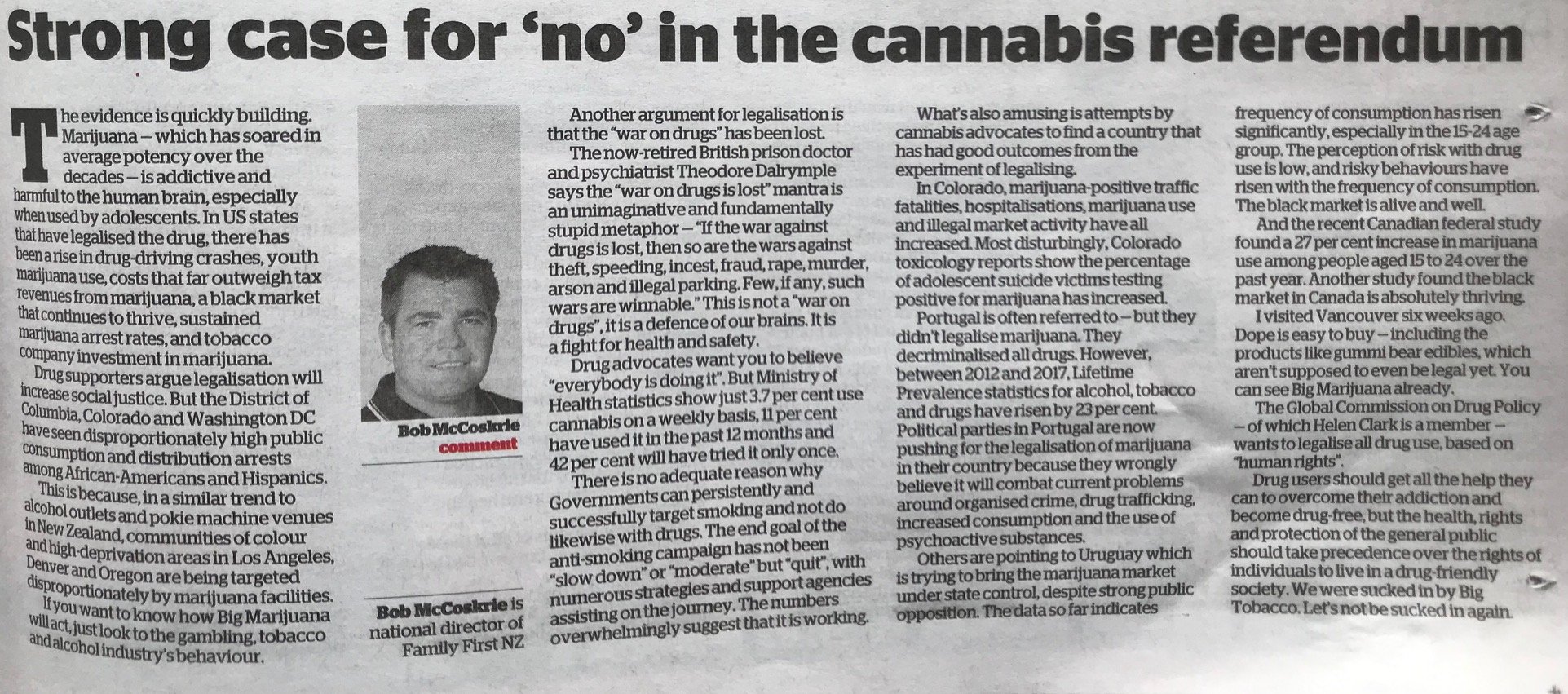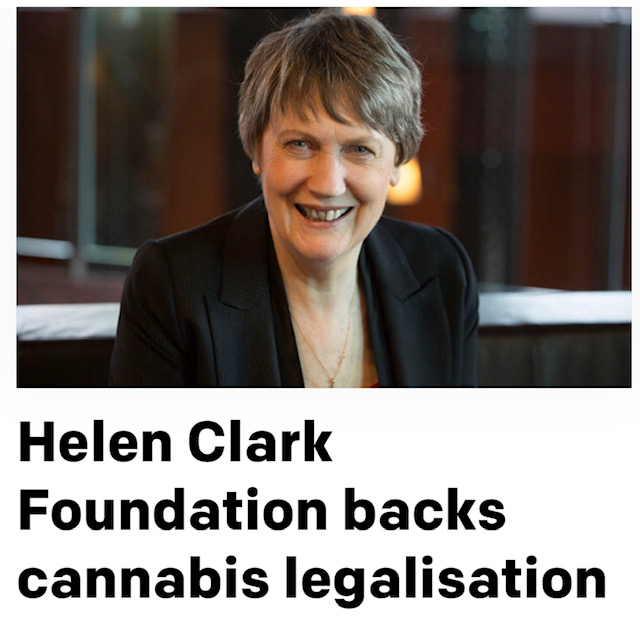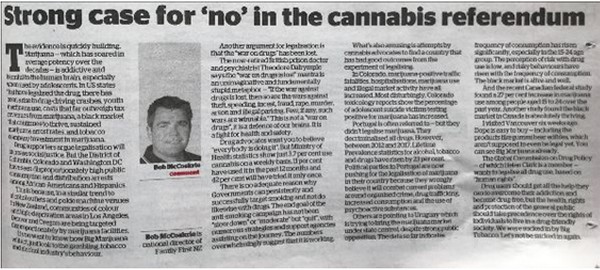Bob McCoskrie: The case for no in the cannabis referendum
NZ Herald 11 September 2019
(In response to the promotion of cannabis legalisation by the Helen Clark Foundation)
https://www.nzherald.co.nz/politics/news/article.cfm?c_id=280&objectid=12266464
 The evidence is quickly building.
The evidence is quickly building.
Marijuana – which has skyrocketed in average potency over the past decades – is addictive and harmful to the human brain, especially when used by adolescents. In US states that have already legalised the drug, there has been an increase in drugged driving crashes, youth marijuana use, costs that far outweigh tax revenues from marijuana, a black market that continues to thrive, sustained marijuana arrest rates, and tobacco company investment in marijuana.
Drug supporters argue that marijuana legalisation will increase social justice. But the District of Columbia, Colorado and Washington D.C. have seen disproportionately high public consumption and distribution arrests amongst African-Americans and Hispanics.
This is because, in a similar trend to alcohol outlets and pokie machine venues here in New Zealand, communities of colour and high deprivation areas in Los Angeles, Denver and Oregon are being subjected to disproportionate targeting by marijuana facilities.
If you want to know how Big Marijuana will act, just look to the gambling, tobacco and alcohol industry’s behaviour.
Another argument for legalisation is that the ‘war on drugs’ has been lost.
The now-retired UK prison doctor and psychiatrist Theodore Dalrymple says that the ‘war on drugs is lost’ mantra is an unimaginative and fundamentally stupid metaphor – “If the war against drugs is lost, then so are the wars against theft, speeding, incest, fraud, rape, murder, arson, and illegal parking. Few, if any, such wars are winnable.”
This is not a ‘war on drugs’ – it is a defence of our brains. It is a fight for health and safety.
Drug advocates want you to believe that ‘everybody is doing it’. But Ministry of Health statistics show that just 3.7% use cannabis on a weekly basis, 11% have used it in the last 12 months, and 42% will have tried it once at some time in their life.
There is no adequate reason why governments can persistently and successfully target smoking and not do likewise with drugs. The end goal of the anti-smoking campaign has not been ‘slow down’ or ‘moderate’ but ‘quit’, with numerous strategies and support agencies assisting on the journey. The numbers overwhelmingly suggest that it is working.
What’s also amusing is attempts by cannabis advocates to find a country that has had good outcomes from the experiment of legalising.
 In Colorado, marijuana-positive traffic fatalities, hospitalisations, marijuana use, and illegal market activity have all increased. Most disturbingly, Colorado toxicology reports show the percentage of adolescent suicide victims testing positive for marijuana has increased.
In Colorado, marijuana-positive traffic fatalities, hospitalisations, marijuana use, and illegal market activity have all increased. Most disturbingly, Colorado toxicology reports show the percentage of adolescent suicide victims testing positive for marijuana has increased.
Portugal is often referred to – but they didn’t legalise marijuana. They decriminalised all drugs. However, between 2012 and 2017, Lifetime Prevalence statistics for alcohol, tobacco and drugs have risen by 23%. Political parties in Portugal are now pushing for the legalisation of marijuana in their country because they wrongly believe it will combat current problems around organised crime, drug trafficking, increased consumption and the use of psychoactive substances.
Others are pointing to Uruguay which is attempting to regulate the marijuana market under state control, despite strong public opposition. The data so far indicates that frequency of consumption has significantly increased, especially in the 15-24 age group. The perception of risk with drug use is low, and risky behaviours have increased with the frequency of consumption, including the use of marijuana during pregnancy. The black market is alive and well.
And the recent Canadian federal study found a 27% increase in marijuana use among people aged 15 to 24 over the last year. Another study found that the black market in Canada is absolutely thriving.
I visited Vancouver six weeks ago. Cannabis is easy to purchase – including the products like gummi bear edibles, which aren’t supposed to even be legal yet. You can see Big Marijuana already. You can smell it.
It’s important to note that the Global Commission on Drug Policy – of which Helen Clark is a member – wants to legalise all drug use, and wants policies based on ‘human rights’ which remove the ‘stigmatisation’ and ‘marginalisation’ of people who use drugs.
Drug users should receive all the help they can to overcome their addiction and to become drug-free, but the health, rights and protection of the general public should take precedence over the rights of individuals to live in a drug-friendly society.
We were sucked in by Big Tobacco.
Let’s not be sucked in again.






